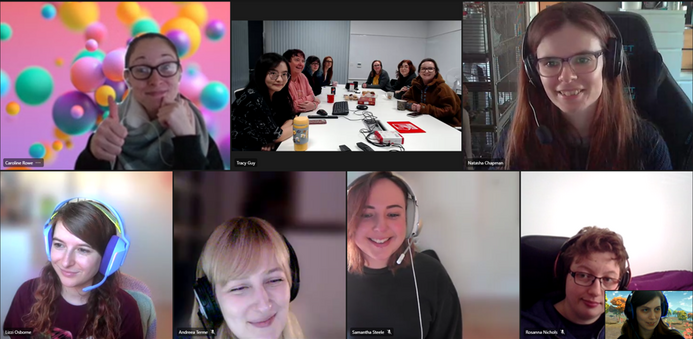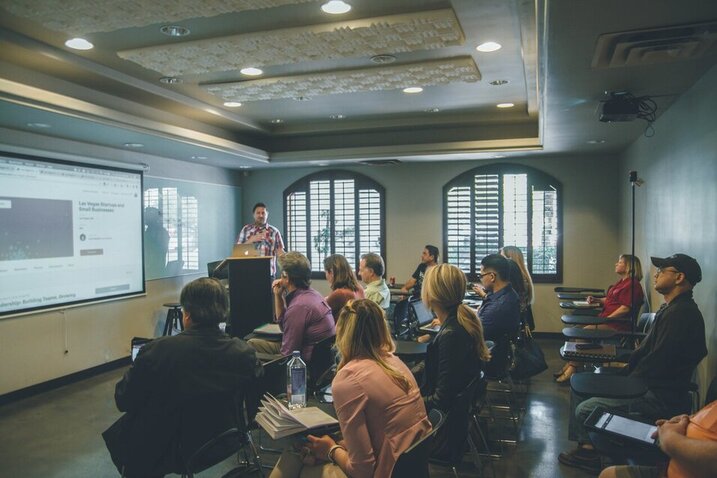March is Women’s History Month, a time when we recognise the contributions women have made to history, science, the arts, society, and more. Throughout last month, we spoke about some of the women our team finds inspiring on Twitter and LinkedIn; we hosted a coffee morning for the women in the studio, and collected for local charities focused on improving the lives of women in need.

[The International Women's Day Coffee Morning at Dambuster Studios]
We also decided that we wanted to try and help more women make their way into the games industry, so we asked the women at Dambuster to share their relevant tips and experiences, which you can read below. But firstly, why is this so important?
The 2022 UK Games Industry Census found that 67% of people working in the games industry are male, compared to 30% female and 3% non-binary. This means that the games workforce has a significantly larger percentage of men and a lower percentage of women than the overall workforce, where the percentage of women is around 48%.
Here are the tips, advice, and experiences of three women currently working at Dambuster.
Remain Open to Opportunities and Build Your Portfolio
First, we’ll hear from Narrative Designer, Lydia Cockerham.
‘Be determined but open. Know what you want but don't deny opportunities that come your way just because they're not perfect. Life is a river, so you might not get there on the schedule you want or how you think you will, but if you stay focused and flexible, the currents may well guide you to exactly where you're supposed to be. On a more practical note, learn everything you can from every role you can - even and especially those outside of the games industry. Almost any skill can be relevant in other situations, so focus on improving your abilities and building up examples of how the work you've done could be applicable to games.
For example, I used my experience writing advertising scripts and informative blogs to show I could also write dialogue for NPCs and technical documentation.
And finally, always be building up your portfolio. Fill it with work you've done in previous roles, work you've done on the side - a selection of 5-10 things you're most proud of and that show off your unique range of skills. If you only focus on one thing, make it your portfolio!’
![]()
Not Sure What Your Perfect Role in Games Looks Like? That’s okay!
Next up, Junior Project Manager, Kayleigh Stevens, will share her advice on finding your place in the industry.
‘Always remember your passions! There is no “right” way to enter the industry, and people will value you more for sticking to what you really care about.
Don’t know what you’re passionate about yet? Try anything and everything (I did!). As someone who aspired to be a level designer, then environment artist, then animator, before settling in Production, don’t be frightened of diving into any subject area that interests you.
Share your work – This is always said, but that’s because it’s so important! Let people see or try your work and get used to receiving feedback. It’s a crucial skill in the industry.’
If You Plan to Study, You Need to Find the Right Course for You
Finally, Audio and Narrative Producer, Nia Wearn, would like to share some advice on finding the right course for you, should you choose to study a game-related discipline. Nia worked in education for over 15 years and has been a lecturer in many different games-associated subjects.
Tips for choosing the right course for you:
'University isn’t the only route into the games industry, but it can be a really useful way to build up your skills in software, learn to work in teams, develop your portfolio, and take advantage of game development opportunities.
The best starting point is to work backwards – start looking at jobs in the industry as it is now – Twitter does great work in highlighting different roles in the industry, and hashtags like #WhatAGameDevLooksLike are fantastic to see the range of studios and variety of roles that people hold. Sites like intogames.org help highlight different roles and disciplines.
Start to look at the careers pages for companies you’d love to work for or the games you play and admire. Look at a big range of studios and job boards like jobs.gamesindustry.biz/ or events like those hosted by gamesjobs.live – Look at junior posts in different disciplines and work out what’s a great fit for where you see yourself.
Look at the requirements in the job descriptions, key skills, software and start making a wish list of what you’ll need for your dream job. Don’t forget the ‘soft skills’ like communication skills and writing. Once you’ve got an idea of where you want to go in the industry, start looking at courses – there are lots out there from many different providers and all of them will have different philosophies and ideas. Start by searching on UCAS (www.ucas.com/) and looking for the job titles you’re interested in, or keywords that you’ve seen from the job descriptions.

Think about the skill set you’ll have upon graduating – look at the options you might have to take on the courses, the software they would teach you, the opportunities to build up your portfolio, and work with other people to make games.
When you visit open days for courses, take time to chat to the tutors, ask them what games they’re playing, and how, and why, they designed the courses they did. If they talk about alumni in the industry, ask the tutors if they did extra things or how they applied themselves in projects and group work.
Ask about what software they teach on the courses and how often they upgrade hardware. If there are specific hardwear setups like music studios, mo-cap rooms, 3D printers – ask about how accessible they are and how easy they are to book or get training for.
Finally, look at the facilities and campus, and ask how busy labs are and how full they are during the day. Take time to look at the library to see what books in your field are available and how up-to-date they are. Look at societies and communities on campus – where are you going to spend your time not in class etc. Consider the whole package of what you’ll be doing and where you’ll be doing it.
Once you’re on your course, throw yourself into the classes, assignments and opportunities like game jams and competitions to help develop your skills and your portfolio. University is a great place to try out things and not worry about if they all succeed – the journey is more important. Hopefully we’ll see you apply for a career with us in a few years.’
We Hope This Was Helpful
There are many different routes for women seeking to get into the games industry, but we hope that by hearing the advice and experiences of some of the women working at Dambuster, you may now have a better understanding of what your pathway may look like.




